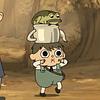You need to sign in or sign up before continuing.
Take a photo of a barcode or cover
A beautiful book that weaves together folk lore and family drama in a unique and wonderfully written way.
challenging
reflective
slow-paced
challenging
dark
emotional
informative
reflective
slow-paced
reflective
slow-paced
Very literally, I have been meaning to read this book for three decades. I have a print copy somewhere that moved from apartment to apartment and house to house. I'm sorry it took me so long to actually open up this classic. It is brilliant and sad and funny. I will read it again sometime soon... or maybe I'll wait another 30 years and read it again when I'm 84.
adventurous
challenging
dark
emotional
mysterious
reflective
medium-paced
challenging
dark
medium-paced
challenging
emotional
reflective
slow-paced
I first read Maxine Hong Kingston's work in college in the early 90's. I am pleased to see that it holds up well to my memory. The book is made up of 5 parts, with 'White Tigers' being the most memorable from my earlier reading. I found that I preferred 'No Name Woman' this time around.
The work is autobiographical, family history, and myth. Which basically sums up all family history, although most of us deny rather than embrace the mythology of our own families.
We all tell our own stories in a variety of ways, and these are told beautifully. " 'The difference between mad people and sane people,' Brave Orchid explained to the children, 'is that sane people have variety when they talk-story. Mad people have only one story that they talk over and over.' " So the wisdom of the mother's talk-story is passed down faithfully to the daughter.
What these stories all share is the voice of women, striving against both the challenges of daily life, and great, nation-altering challenges. The loneliness of this burden women carry is expressed in unique ways depending upon the woman. For one, "Nobody supports me at the expense of his own adventure. Then I get bitter: no one supports me; I am not loved enough to be supported. That I am not a burden has to compensate for the sad envy when I look at women loved enough to be supported."
And yet the strength of the women in myth, legend, and family household is undeniable. Women's strength is learned and nurtured by other women. And when these women have given up themselves to and for one another, and are then separated, the pain is significant. " 'Aiaa,' she sighed, 'how can I bear to have you leave me again?'
How can I bear to leave her again?"
I am glad to have re-read this one, as I think these female relationships resonate much more with me now than almost 30 years ago.
The work is autobiographical, family history, and myth. Which basically sums up all family history, although most of us deny rather than embrace the mythology of our own families.
We all tell our own stories in a variety of ways, and these are told beautifully. " 'The difference between mad people and sane people,' Brave Orchid explained to the children, 'is that sane people have variety when they talk-story. Mad people have only one story that they talk over and over.' " So the wisdom of the mother's talk-story is passed down faithfully to the daughter.
What these stories all share is the voice of women, striving against both the challenges of daily life, and great, nation-altering challenges. The loneliness of this burden women carry is expressed in unique ways depending upon the woman. For one, "Nobody supports me at the expense of his own adventure. Then I get bitter: no one supports me; I am not loved enough to be supported. That I am not a burden has to compensate for the sad envy when I look at women loved enough to be supported."
And yet the strength of the women in myth, legend, and family household is undeniable. Women's strength is learned and nurtured by other women. And when these women have given up themselves to and for one another, and are then separated, the pain is significant. " 'Aiaa,' she sighed, 'how can I bear to have you leave me again?'
How can I bear to leave her again?"
I am glad to have re-read this one, as I think these female relationships resonate much more with me now than almost 30 years ago.
adventurous
challenging
mysterious
slow-paced
A book that presents valid thoughts on the Asian American identity but seemingly panders to greater audiences to spread its messages. Why does Kingston not even comment on Vietnam when she protested it? Why is Japanese internment one sentence that describes her bullies? Why are people's Chinese names their secret names that hold power over a person? And why is the Cantonese meaningless in some places when it's translated? With the utmost respect for Kingston for breaking barriers in her commercial success with this book, I do not understand it at all.



